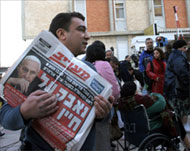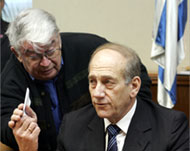Sharon doctors watch and wait
After a third bout of emergency brain surgery in 48 hours, doctors treating Ariel Sharon say it is still too early to assess how much damage the Israeli leader has suffered following a massive stroke.

On Friday a spokesman for Jerusalem’s Hadassah Hospital said a brian scan had shown that surgeons had relieved pressure on his brain and succeeded in stopping internal bleeding.
Sharon showed “significant improvement” after the five hours of brain surgery and intracranial pressure returned to normal, hospital officials said.
Dr Shlomo Mor-Yosef, the Hadassah Hospital director, said despite the improvement, Sharon remains in a critical condition.
An official determination on Sharon’s condition will
likely take place on Sunday, when doctors plan to wean him
off the drugs that are keeping him in what they said is a
medically induced coma.
Earlier, Sharon was taken back into the operation theatre for emergency surgery after a brain scan revealed further bleeding after his devastating stroke.
Sharon, who suffered a stroke on Wednesday, underwent six hours of surgery at the time to stem bleeding in his brain.
A subsequent scan showed further bleeding in several areas, leading doctors to operate for another hour to control it.
Stability
Independent neurosurgeons not involved in Sharon’s treatment said a full recovery was unlikely after such a massive stroke effectively ending his political career.
Sharon was taken to Jerusalem for treatment late on Wednesday from his ranch in the Negev desert in southern Israel.
 |
|
Israeli media have begun to |
Sharon’s deputy, Ehud Olmert, took the reins on Thursday as acting prime minister and tried to convey a sense of stability, but Sharon’s grave condition left Israelis stunned and threw his peace agenda into doubt.
Sharon’s collapse less than three months before elections left his moderate Kadima party, which appeared headed for an easy victory, in limbo.
Key members of Kadima have vowed to rally around Olmert, easing concerns that the party, founded by Sharon two months ago, might fracture in his absence.
A new poll released on Friday showed Kadima emerging victorious in March 28 elections under Olmert’s leadership.
Aides to Sharon said they were working on the assumption he would not return to work.
Opinion polls have predicted that Sharon, 77, would easily win a general election scheduled for 28 March. He was due to contest the election at the head of Kadima, his newly formed centrist party. He recently left Likud, where right-wingers had criticised the withdrawal from Gaza.
Aluf Ben, Haaretz’s diplomatic correspondent, wrote on the newspaper’s website: “With all due caution, it appears as though the era of Sharon leading Israel has reached its tragic end.”
The Final Battle
Israel‘s largest newspaper, Yedioth Ahronoth, summed up Sharon‘s situation with the headline “The Final Battle”.
George Bush, the US president, said: “Prime minister Sharon is a man of courage and peace. On behalf of all Americans, we send our best wishes and hopes to the prime minister and his family.”
 |
|
Ehud Olmert, the deputy prime |
Sharon had been due to undergo an operation on Thursday at Hadassah to repair a tiny hole in his heart thought to have caused the blood clot that led to a minor stroke on 18 December.
Doctors speculated on Israeli television that blood-thinning drugs administered over the past two weeks may have contributed to Wednesday’s more severe stroke.
After several days in hospital last month Sharon quickly ploughed back into a punishing public schedule.
He has campaigned on a reconciliatory platform to give up more occupied land in the West Bank as a way to end decades of conflict, but has vowed to keep large settlement blocs.